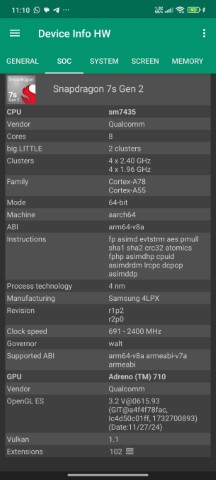Comparing: Intel Core i9 11900F vs Qualcomm SM7435-AB Snapdragon 7s Gen 2
In this comparison, we analyze two Processors: Intel Core i9 11900F and Qualcomm SM7435-AB Snapdragon 7s Gen 2, using synthetic benchmark tests to evaluate their overall performance. This side-by-side comparison helps users understand which hardware delivers better value, speed, and efficiency based on standardized testing. Whether you're building a new system or upgrading an existing one, this benchmark-driven evaluation offers valuable insights to guide your decision.

Qualcomm SM7435-AB Snapdragon 7s Gen 2
| Type: | Processors |
|---|---|
| Brand: | Qualcomm |
| Model: | Snapdragon 7s Gen 2 |
Specification Comparison Table
This specification comparison presents technical details of several devices or components to help you understand the key differences between each option. Use this table as a reference to determine which device best suits your needs.
| Specification | Intel Core i9 11900F | Qualcomm SM7435-AB Snapdragon 7s Gen 2 |
|---|---|---|
| Architecture | x86 | ARM |
| Technology | 14 nm | 4 nm |
| Clock | 2.5 GHz - 5.2 GHz | 1.9 GHz - 2.4 GHz |
| Core/Thread | 8 / 16 | 8 / 8 |
| Segmen | Desktop | Mobile |
Submission Comparison Table
This submission comparison table displays the number and details of benchmark data submissions from various devices or components. This information helps you understand the performance based on the benchmarks that have been tested, as well as providing an overview of the consistency and popularity of the available benchmark results.
Submission Comparison Chart
This chart visualizes the benchmark scores comparison between two hardware devices based on submitted data.
Media Gallery
A collection of photos of tested hardware. These images can help you identify the physical form, model, and variant of the hardware in question. These photos are from our own documentation, and if they are not available we may not be able to document them.
About Hardware Intel Core i9 11900F
The Intel Core i9-11900F, launched in 2021, is a high-end desktop processor from the 11th generation Rocket Lake family. Featuring 8 cores and 16 threads, this CPU is built for users who demand strong single-core performance in tasks such as gaming, creative workloads, and professional applications. With a base clock speed of 2.5 GHz and a boost clock up to 5.2 GHz via Intel Turbo Boost Max Technology 3.0, the i9-11900F delivers fast responsiveness and excellent performance in lightly threaded scenarios.
Manufactured on the 14nm process, the i9-11900F introduces architectural improvements over its predecessor, including a significant IPC (Instructions Per Cycle) gain, thanks to the new Cypress Cove core design. However, despite these gains, the reliance on the older 14nm node leads to higher power consumption and lower efficiency compared to AMD’s Ryzen 5000 series built on 7nm technology—especially in sustained multi-threaded workloads.
As an “F” series processor, the i9-11900F lacks integrated graphics, meaning it requires a dedicated GPU to operate. This makes it a better fit for gaming PCs or professional workstations that already include a discrete graphics card. While this may not be ideal for users seeking basic systems without a GPU, it allows Intel to price the CPU more competitively.
In benchmarks and real-world performance tests, the Core i9-11900F excels in gaming, offering frame rates comparable to top-tier CPUs when paired with a modern graphics card. It also performs well in productivity tasks such as photo editing, software development, and video rendering—though users working with highly threaded applications might benefit more from CPUs with higher core counts.
Overall, the Intel Core i9-11900F is a solid choice for enthusiast builders, gamers, and users looking for top-tier single-core performance, but it may not be the most efficient option for heavy multitasking or rendering workloads when compared to newer multi-core CPUs.
Monday, 20 June 2022 07:37:04 | Update: 1 month ago
About Hardware Qualcomm SM7435-AB Snapdragon 7s Gen 2
The Qualcomm Snapdragon 7s Gen 2 (SM7435-AB) is one of the latest System on Chip (SoC) solutions designed to deliver high performance in the mid-range segment without compromising on energy efficiency. Built using advanced 4nm fabrication technology, this chip offers an ideal balance between processing power, energy efficiency, and robust graphics capabilities. The Snapdragon 7s Gen 2 features an octa-core CPU configuration (8 cores/8 threads) operating at clock speeds ranging from 1.9GHz to 2.4GHz, enabling it to handle a variety of computational tasks, from light multitasking to casual gaming.
While details such as L3 cache and the official codename have not been widely disclosed, the chipset's performance is evident from benchmark results. In testing using the Xiaomi Redmi Note 13 Pro 5G running Xiaomi HyperOS 1 based on Android 14, the Snapdragon 7s Gen 2 achieved competitive scores in its class. In the AnTuTu v10 benchmark app, the CPU score reached 200,590 points, positioning it as one of the top choices in the mid-range segment. Meanwhile, in the Geekbench 6 synthetic performance test, the chipset achieved a score of 1,026 for single-core and 2,916 for multi-core, proving that this SoC can handle various modern applications smoothly.
For graphics, the Snapdragon 7s Gen 2 relies on the integrated Qualcomm Adreno 710 GPU, which is sufficiently capable for playing popular games at medium to high graphics settings. The chipset also uses a BGA (Ball Grid Array) socket design, a common standard for modern mobile devices, ensuring dense and efficient integration.
The test device uses 256GB UFS internal storage and 8GB RAM, ensuring no memory bottlenecks during benchmarking. All testing was conducted on a brand-new device, using the latest operating system and benchmarking applications, and after all system updates were applied.
Overall, the Snapdragon 7s Gen 2 is an excellent choice for users seeking a balance of performance, efficiency, and reliability in a mid-range device. With solid benchmark results and 4nm fabrication technology, this chipset is one of the most competitive options in the current 5G smartphone market.
Device Test (testbed):
Device: Xiaomi Redmi Note 13 Pro 5G
Specs: Snapdragon 7s Gen 2, 256GB UFS, 8GB RAM
OS: Xiaomi HyperOS 1 (Android 14)
* Testing device in new condition, latest benchmark software, and latest system updates
Wednesday, 09 July 2025 23:12:14 | Update: 6 days ago


